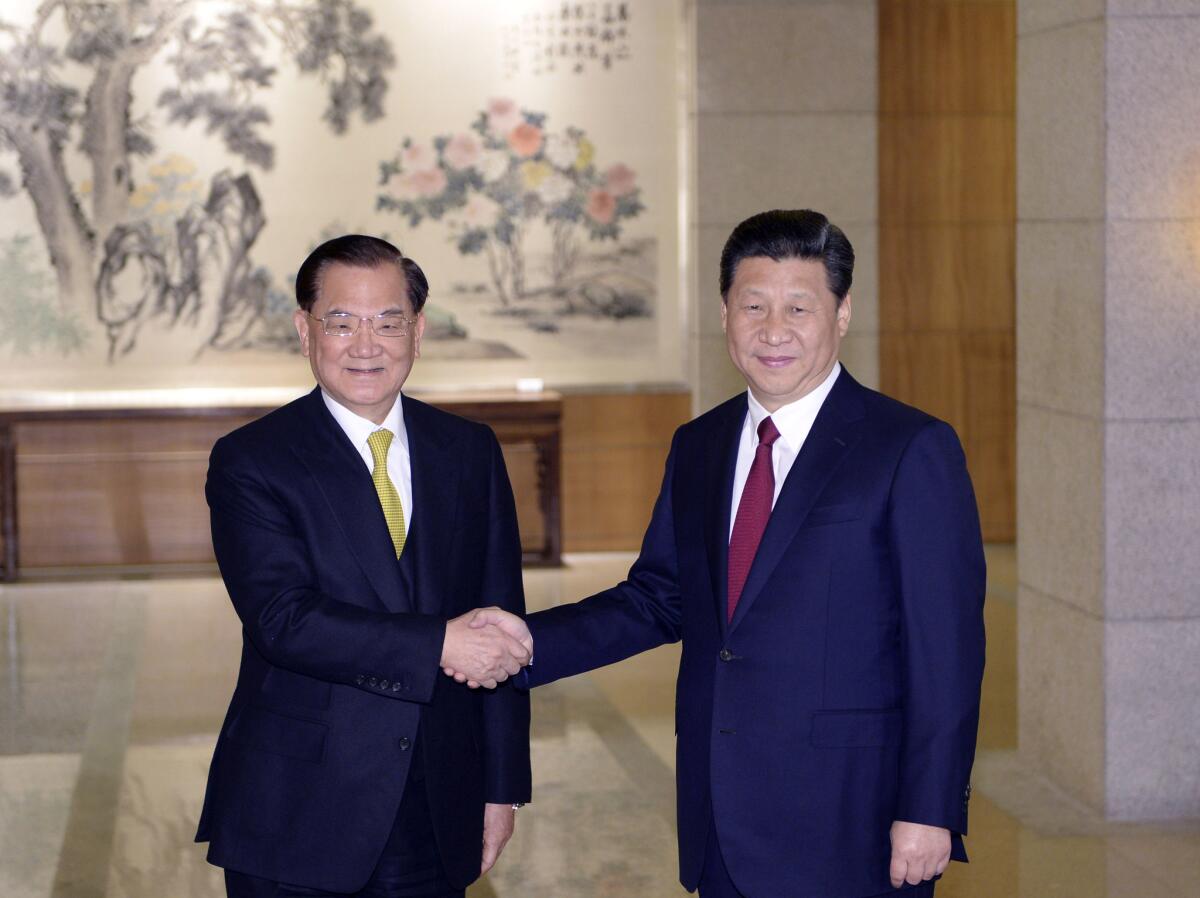Taiwan rebuffs Chinese leader’s new pitch for unification

- Share via
Reporting from Taipei, Taiwan — Taiwan has sharply rejected Chinese President Xi Jinping’s suggestion that the two sides end more than six decades of hostile separation by adopting a “one country, two systems” model like the one employed to achieve the return of the former British territory Hong Kong to Chinese sovereignty.
Dashing hopes in Beijing for reunification in the immediate future, the Taiwan government’s Mainland Affairs Council said in a statement that more than 70% of Taiwanese people consider the Chinese Communist Party leader’s idea “unfit” for their democratic, self-ruled island. Mainland China and Taiwan split amid civil war in 1949.
“Regarding mainland China’s comments related to ‘one country, two systems,’ our government has no way of accepting them,” the council said late Friday.
The timing of Xi’s suggestion on Friday that mainland China and Taiwan could reconcile under a “one country, two systems” arrangement came at a curious juncture. Hong Kong democracy activists are waging a furious battle against authorities in Beijing, accusing mainland leaders of reneging on promises to allow truly open elections for the territory’s chief executive in 2017.
Many Taiwanese have been closely following the events in Hong Kong, and Taiwanese President Ma Ying-jeou’s called this month for stronger democracy in the territory.
The former British colony returned to Chinese sovereignty in 1997, and the “one country, two systems” framework was supposed to ensure that the region of 7 million was granted a high degree of economic and political autonomy for 50 years.
Taiwan’s rebuke to Xi and its expressions of support for democracy in Hong Kong look to pose setbacks for Beijing’s long-held goal of reunification.
Xi made his comments on Friday in Beijing to a Taiwanese delegation led by the head of a minor pro-unification party. It appears to be the first time Xi has publicly pushed the “one country, two systems” framework vis-a-vis Taiwan since he became head of the Chinese Communist Party in 2012.
“Peaceful unification and ‘one country, two systems’ are our guiding principles in solving the Taiwan issue,” Xi told the delegation, as quoted by Taiwan’s official Central News Agency.
Mainland China and Taiwan have been separately ruled since the Chinese civil war of the 1940s, when Chiang Kai-shek’s Nationalists fled Mao Tse-tung’s Communists to Taipei, where they set up a rival government. After decades of icy relations marked by occasional threats of war, Ma’s government in 2008 brokered talks on nonpolitical issues such as trade and investment.
The two sides have signed more than 20 nonpolitical accords – bringing millions of Chinese tourists to the island and lowering trade barriers to push total imports and exports to a record $124 billion in 2013. But Xi has pushed a reluctant Taiwan to discuss politics; in October last year, he said political issues involving Taiwan should not be “passed on generation after generation.” But Taiwan’s president has said he has no timeline for such discussions.
Xi may have made his comments Friday to take Taiwan’s temperature again, said Nathan Liu, international affairs professor at Ming Chuan University in Taiwan.
“Maybe it’s a trial balloon to see if Ma Ying-jeou is really eager for a Ma-Xi meeting,” Liu said, referring to what would be an unprecedented encounter between the two presidents. “The second guess is that [the comments] were reassurance of the effectiveness of ‘one country, two systems.’ Two systems isn’t working well in Hong Kong, so they’re worried this is setting a bad example in Taiwan.”
Jennings is a special correspondent.
More to Read
Sign up for Essential California
The most important California stories and recommendations in your inbox every morning.
You may occasionally receive promotional content from the Los Angeles Times.










